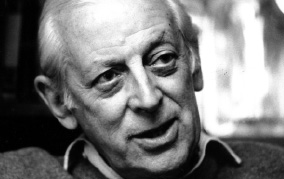Alistair Cooke
Alistair Cooke, smoother of transatlantic tensions, died on March 30th 2004, aged 95

FOR as long as anyone can remember, Alistair Cooke was the perfect embodiment of the special relationship. British ambassadors sometimes take Washington by storm, but more usually blend in with the scenery. British prime ministers sometimes forge real personal bonds with American presidents, but more often have to do with the make-believe kind. Mr Cooke, a BBC broadcaster, was different. For more than half a century he formed a solid, though urbane, one-man bridge between the two cultures.
Every Thursday, for 58 years, he wrote his “Letter from America”. He would compose in his Manhattan flat, picking away at his typewriter, with the trees of Central Park laid out before him. The letters were generally pegged to some current event, but anything less like the urgent hectorings of foreign correspondents would be hard to imagine. Mr Cooke was a master of the perambulatory style. Each letter wandered for 15 minutes down all sorts of highways and byways only to end up, just when it seemed he must have lost his way, at his intended destination.
His voice alone lured listeners on. It was a treasure, light and high, with a jaunty breathiness honed by decades of smoking, and with a curious accent that floated somewhere in the mid-Atlantic. And this was where he belonged, patiently explaining one side to the other.
He had first seen America in the early 1930s, travelling on a Harkness Fellowship. Even in the Depression, its energy and vitality astonished him. “The landscape and the people”, he once said, “were far more gripping and dramatic than anything I had ever seen.” Until then, his interest had lain vaguely in the theatre. From then on, it shifted to what he saw as the real drama unfolding in the world – the United States. In 1941, he became an American citizen.
Mr Cooke made his analysis of his new country sound easy, but it was not. As he well knew, the superficial similarities between Britain and America hid differences that lay deep and needed careful unravelling. “The stress will tend always to be on the springs of American life, whose bubbles are the headlines, rather than on the headlines themselves,” he told the BBC as the letters began, in 1946.
In his first, he told weary Britons that even New York was a war casualty, driven to burning filthy soft coal and hoarding butter. In his last, delivered a month before his death, he reminded his audience that Bill Clinton might well have invaded Iraq but for the Monica Lewinsky affair. “By the time Clinton was ready to mobilise an American or allied force, he didn’t possess the moral authority to invade Long Island.” In the almost 3,000 letters in between – he missed only three broadcasts – he covered all the most important events in modern American history, from Watergate to September 11th, from the black market in beef to the Black Panthers, from Vietnam to the California recall.
Mr Cooke was almost as influential in shaping America’s image of Britain. As the host of “Masterpiece Theatre” for two decades, he carefully nurtured the idea that Britain continued to play Greece to America’s Rome. He sat in his easy chair surrounded by books and enveloped by civilisation, but with no trace of that superiority that sometimes seems natural to Limeys. “As empires go,” he once told his American audience, “the British empire was a wink in the eye of history.”
In 1976 his adopted country paid him the highest compliment imaginable, when Congress chose him to give the keynote address at its bicentennial celebration. It was all a very long way from Salford, near Manchester, where he had been born as plain Alfred Cooke, the son of a metalworker. His elder brother left school at 15 to become a butcher. But Alfred shinned up the scholarship ladder, togrammar school and Cambridge, before winning that fateful Harkness Fellowship.
Though known mostly as a broadcaster after 1938, when the BBC made him its chief commentator on American affairs, Mr Cooke was also for 27 years the chief American correspondent for the Manchester Guardian. He short-changed neither employer, at one stage sending the newspaper 4,000 words a day. Yet, as he admitted, he was seldom present at “a single accidental convulsion of history”. The few exceptions became fodder for his most compelling letters, as when he found himself in the hotel pantry where Robert Kennedy was shot in 1968. That place, he told his audience, “I suppose will never be wiped out of my memory: a sinister alley, a Roman circus run amok, and a charnel house. It would be quite false to say, as I should truly like to say, that I’m sorry I was there.” For once, his journalistic instincts were trumping his good manners.
The world that produced Mr Cooke has gone. Americans increasingly see British journalists not as civilised gentlemen but as drunken spongers, like Peter Fallow in Tom Wolfe’s “Bonfire of the Vanities”. The Guardian, the descendant of Mr Cooke’s old paper, routinely presents Americans as bloodthirsty lard-arses. The two countries, ostensibly allies, too often view each other suspiciously and lovelessly. At Mr Cooke’s death, the special relationship had never needed him more.